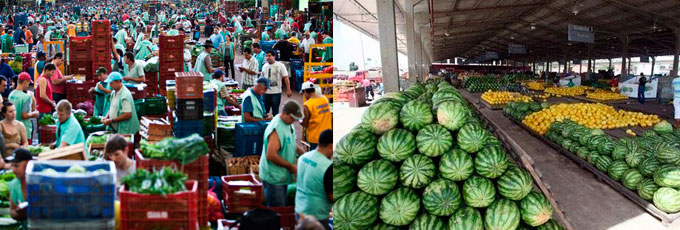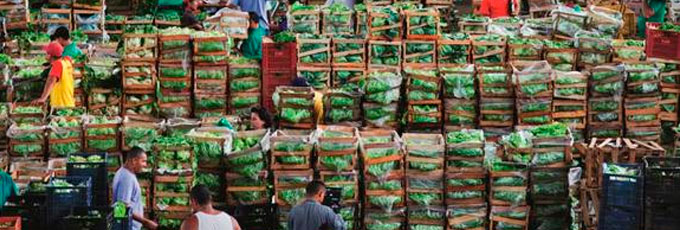CEASA (State Supply Center). Ceasas are state-owned or mixed capital companies (public and private), aimed at improving the marketing and distribution of fruit and vegetables, fish and flowers.
The agricultural producer sends trucks with their production to Ceasa. Ceasa’s vendor stalls sell the products to buyers (retailers) and pass the sales value on to rural producers, earning a commission on the total sold.
Today, the State Supply Center (CEASA) no longer exists in the city of São Paulo, as its merger with the Companhia de Armazéns Gerais do Estado de São Paulo (CAGESP) resulted in CEAGESP (Companhia de Entrepostos e Armazéns Gerais de São Paulo). ) which opened in May 1969 and operates as a wholesale supply center to this day.
CEASA History
Ceasas appeared in Brazil in the late 1960s, when the Federal Government identified a major bottleneck in the country’s horticultural marketing system. With the rapid growth of urban centers in the country, the process of distributing fruit and vegetables has become expensive, complex and inefficient.
The exclusive use of direct sales or autonomous intermediaries of agricultural products generated difficulties in the formation of prices, in competition between producers, in the homogenization of production, and mainly in the distribution of products to the retail market (fairs, grocery stores, supermarkets, greengrocers, restaurants etc.).
For its implementation, it sought help from international organizations, such as the FAO – United Nations Food and Agriculture Organization – and also based itself on the experience of other countries in techniques for planning, building and operating wholesale markets. With the partnership of state and municipal governments, Ceasas were built in the main capitals of the country.

What is traded?
Fruits, vegetables, vegetables, eggs, fish, flowers, fish and ornamental plants are sold at Ceasas. Some products are sold at specific times and days of the week, and the same area can be used by more than one category of products. Some highly perishable products, such as fish and flowers, are usually sold from dawn.
How does it work?
The operation of Ceasas is based on the participation of 3 main agents: Merchants, Producers, and Buyers. Know the role of each of them:
Traders ( Boxes and stones )
Private companies rent areas in Ceasas, called “Boxes”, intended for the marketing and storage of products. Smaller areas, without fixed structures, being cheaper and generally destined for the vegetable and vegetable trade are commonly called “stones”.
The areas are granted to traders, also called “permissionaires”, through public tenders. Boxes earn commissions of around 17% of the total sales value.
Producers ( Suppliers )
Any producer interested in marketing their products through Ceasa can contact Ceasa and request the contact of Boxes that may be interested in their product. After negotiating the shipment of the cargo to the Box, the producer can now send his product to Ceasa.
Buyers (Retailers)
Any person or company can buy from Ceasa, including the final consumer, as access to the site is free. However, Ceasa is intended for wholesale sales, and the minimum purchase quantities are established in wholesale volumes. Potatoes, for example, are sold in closed 60 kg bags, and peaches are sold at least in 6 kg boxes.
It is not possible to purchase smaller quantities or in installments. Another point to be considered is the bargaining power of the buyer, as the greater the volume to be purchased, the greater the ability to negotiate prices.
Other agents
To help in the formation of prices, Ceasas have price researchers who visit the stands throughout the day, generating the quotation for each product, informing the minimum, common (average) and maximum values practiced. The values are available online, and are also taken as a basis for price negotiations.
A considerable cost in marketing through Ceasas is the unloading of products by shippers, called “plates”, usually paid for by the boxes, but later deducted from the payment to the producer.

Other information
Employees
For if dealing with mixed capital companies, the employees are hired under the CLT regime, and not statutory as civil servants.
Direct purchase
Despite being a more efficient mechanism in the commercialization of small and medium volumes of products, Ceasas are not very advantageous to large retail chains, such as large hypermarkets.
The negotiation and direct purchase with the producer is often carried out by these groups, as it reduces their costs by eliminating an intermediary, the wholesaler. However, this direct sales strategy makes it difficult to sell the production of small producers, who do not have sufficient scale for direct sales.
Post-harvest losses
Product losses due to inadequate transport, storage and handling practices are one of Ceasas’ major problems. Public universities have been working to find solutions to reduce these losses, generating products in greater quantity, quality, and with less waste.
